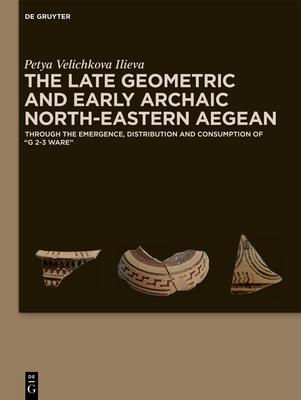The book focuses on the archaeology of the Late Geometric and Early Archaic North-Eastern Aegean through the emergence, manufacture, distribution and consumption of a regional pottery group known as G 2-3 Ware. It offers the first comprehensive, in-depth study through combination of scientific (fabric analysis) and traditional (morphological, stylistic, comparative and distribution analysis) methods. The large body of studied material allows for drawing conclusions on a broader geographical and historical scale, in contrast to earlier studies focused on individual sites. The manufacture, distribution and consumption patterns are characterised by diversity, which reflects a dynamic, multiethnic communication network developed in the Northern Aegean basin in the late 8th and the 7th c. BC. The adoption of G 2-3 Ware by local, Thracian coastal communities is discussed in the light of transfer of knowledge and social practices. It is argued that the G 2-3 Ware potters were aware of earlier and contemporaneous ceramic developments in southern Greece and Anatolia and created a blend of pottery features specific for each one of these areas. The study deconstructs the forged link between G 2-3 Ware and the Greek colonisation in the area, by linking it to a local, pre-colonial development.

The Late Geometric and Early Archaic North-Eastern Aegean: Through the Emergence, Distribution and Consumption of 'g 2-3 Ware'
The book focuses on the archaeology of the Late Geometric and Early Archaic North-Eastern Aegean through the emergence, manufacture, distribution and consumption of a regional pottery group known as G 2-3 Ware. It offers the first comprehensive, in-depth study through combination of scientific (fabric analysis) and traditional (morphological, stylistic, comparative and distribution analysis) methods. The large body of studied material allows for drawing conclusions on a broader geographical and historical scale, in contrast to earlier studies focused on individual sites. The manufacture, distribution and consumption patterns are characterised by diversity, which reflects a dynamic, multiethnic communication network developed in the Northern Aegean basin in the late 8th and the 7th c. BC. The adoption of G 2-3 Ware by local, Thracian coastal communities is discussed in the light of transfer of knowledge and social practices. It is argued that the G 2-3 Ware potters were aware of earlier and contemporaneous ceramic developments in southern Greece and Anatolia and created a blend of pottery features specific for each one of these areas. The study deconstructs the forged link between G 2-3 Ware and the Greek colonisation in the area, by linking it to a local, pre-colonial development.